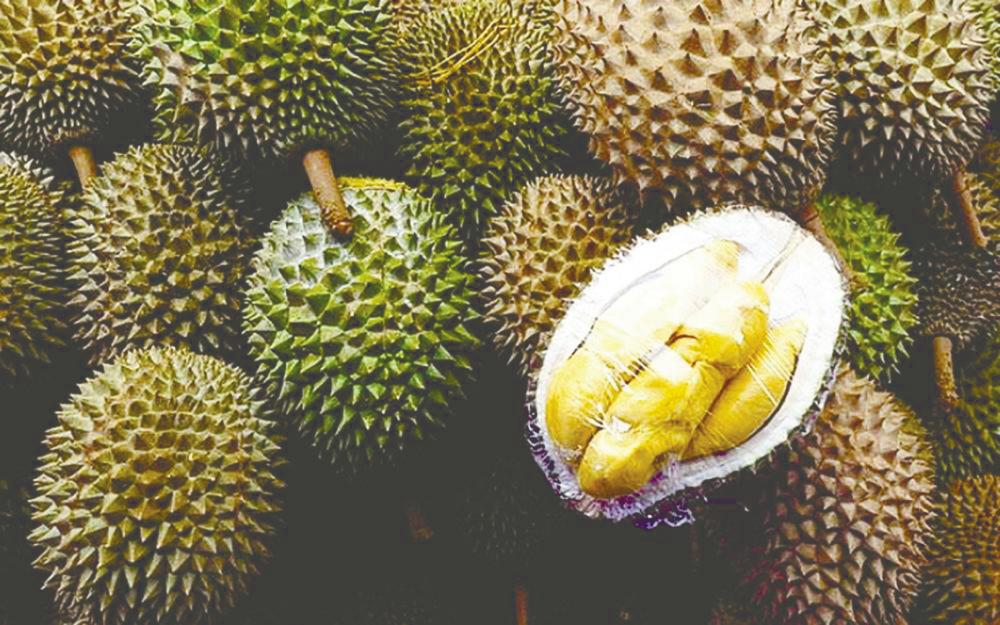PETALING JAYA: Durian prices are at a historical high amid low yield due to bad weather this season, said Simon Chin, co-founder of Duricious Sdn Bhd, owner of the D’King brand.
He said Musang King is the most expensive durian now at RM90 per kg, compared with RM70 per kg last year.
He explained that the increase in durian prices is not due to inflation that is faced by the public, but rather to bad weather that has caused a lower yield this season.
“Durian prices are very high not because of inflation (but) because of the season ... 50% less yield because of the weather. We are facing a shortage of durian now in July,” he told SunBiz, adding that the 50% yield decrease year-on-year is for all types of durian varieties, especially Musang King.
Despite the lack of supply, there is still high demand for the king of fruits, both locally and internationally.
“The demand, of course (gets) higher and higher. It’s now July, and the fruit yield is so low (and) it is almost coming to the end of the season. Normally, July is a bumper season, whereby durian from Penang, Johor, Pahang, all come together but this year is so ‘weird’,” he said.
Despite the lower yield, Duricious’ sales have gone up due to its strategy to focus on new export markets and online selling.
“Sales are increasing but the yield is not. The yield decreased by 50% overall, but our company’s sales increased because of new markets like the US and Japan. We go for new markets besides China,” Chin said.
During the pandemic, the company focused on selling its products online and saw an increase in sales compared with pre-pandemic levels. Chin said it expanded its foreign presence and it now exports to 13 markets, including China, Hong Kong, Australia, the United States, Japan and Indonesia. Moreover, the relaxing of standard operation procedures and the reopening of the economy are contributing to an increase in revenue due to demand from local consumers.
On local demand, Chin pointed out the durian industry has a well-established presence in Malaysia and remarked that the younger generation does a lot of online shopping, which will increase market demand for the fruit.
He believes the durian industry is seeing a 15–20% growth in sales and volume annually, due to an increase in the number of durian plantations and durian trees planted which will contribute to more yield.
Asked whether the fruit is overvalued, Chin pointed out that running a durian plantation is not easy. A planter has to have multiple skills in order to be able to run a successful plantation.
Currently, he said, the value is high in the local market, which is not healthy for the industry and he opined that the price should be lower at around RM30–40 per kg. He believes that lowering the price will be good for the local market and healthy for the export market.
Chin estimated that this year it will rake in RM50 million in sales compared with last year’s RM40 million for its export and import business. The bulk of its sales or 80% are from the export market, and China makes up half of its export market. The remaining 20% is from the local market.
Chin noted that the current season is coming to an end and expressed hope that there will be better yield towards December and January, which is a small-scale durian season. He foresees that due to the lack of supply, durian prices will not decrease and the next season will be another opportunity for harvest, which it expects to go mostly towards the export market.
Chin is cautious on the outlook because the volume is so low and if this season proves to be insufficient, the exporter will most likely wait for the next season to achieve its export target.
Meanwhile, Top Fruits Plantations Sdn Bhd managing director Dr Tan Sue Sian is optimistic on the durian industry, but is concerned about the market growing at a faster pace than supply permits.
“Very good. Bigger focus should be on export grade durian. Unable to meet the demand in the next five years as market grows too fast versus planting,” he told SunBiz.
Tan said all planters need to focus on planting durian varieties such as Musang King, Black Thorn and Golden Phoenix due to inadequate supply to meet demand.
He acknowledged that the price for export grade durian is a “bit overvalued” as demand surpasses supply. However, it is undervalued in terms of local grade due to operating expenses increasing by almost 30%, which include wages, and fertiliser, herbicide and pesticide costs.
According to reports, Deputy Agriculture and Food Industries Minister Datuk Seri Ahmad Hamzah said the value of durian exports has grown by RM74.8 million or 107% in the five years since 2016.















